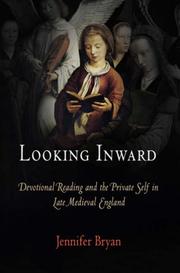| Listing 1 - 3 of 3 |
Sort by
|
Book
ISBN: 3110205718 9786612073489 1282073486 3110214016 9783110205718 9783110214017 9781282073487 6612073489 Year: 2008 Publisher: Berlin New York
Abstract | Keywords | Export | Availability | Bookmark
 Loading...
Loading...Choose an application
- Reference Manager
- EndNote
- RefWorks (Direct export to RefWorks)
Die interdisziplinäre Debatte über die Genese des autonomen Subjekts hat bisher unter weitgehender Ausblendung der Vormoderne stattgefunden. Auf diesen Mangel reagiert der vorliegende Band: In zum Teil eng miteinander vernetzten Beiträgen wird die Geschichtsschreibung der Subjekts- und Selbstvorstellungen an antiken wie nachantiken Texten präzisiert und in mancher Hinsicht revidiert. Zur Debatte stehen Konzepte von Selbst und Subjekt, von Individuum, Person- und Sprecheridentität in Rhetorik, Poetik, Philosophie und Theologie; dazu gehören im besonderen Erscheinungsformen des "lyrischen Ich" und der Autorschaft. Die oft textnahen Interpretationen sind eingebettet in die breitgefächerte Diskussion methodologischer und theoretischer Probleme (z.B. Subjektivität und Textualität, Identität und Alterität, Individualität und Autobiographie als Themen antiker Texte oder Begriffe ihrer Beschreibung sowie ästhetische und poetologische Fragestellungen), unter Berücksichtigung ihrer jeweiligen historisch-politischen Dimensionen. Darüber hinaus rückt die Auseinandersetzung mit und Transformation von antiken Konzepten in der Moderne in den Blick.
Classical literature --History and criticism.
---
Greek literature -- History and criticism.
---
Antiquity of human beings
---
Origin of human beings
---
Antik litteratur
---
Selbst (Motiv).
---
Selbst
Book
ISBN: 9783825354435 3825354431 Year: 2008 Publisher: Heidelberg Universitätsverlag Winter
Abstract | Keywords | Export | Availability | Bookmark
 Loading...
Loading...Choose an application
- Reference Manager
- EndNote
- RefWorks (Direct export to RefWorks)
Gruppenidentität (Motiv).
---
Gruppenidentität

ISBN: 0812240480 1322510407 0812201493 9780812240481 Year: 2008 Publisher: University of Pennsylvania Press
Abstract | Keywords | Export | Availability | Bookmark
 Loading...
Loading...Choose an application
- Reference Manager
- EndNote
- RefWorks (Direct export to RefWorks)
"You must see yourself." The exhortation was increasingly familiar to English men and women in the two centuries before the Reformation. They encountered it repeatedly in their devotional books, the popular guides to spiritual self-improvement that were reaching an ever-growing readership at the end of the Middle Ages. But what did it mean to see oneself? What was the nature of the self to be envisioned, and what eyes and mirrors were needed to see and know it properly? Looking Inward traces a complex network of answers to such questions, exploring how English readers between 1350 and 1550 learned to envision, examine, and change themselves in the mirrors of devotional literature. By all accounts, it was the most popular literature of the period. With literacy on the rise, an outpouring of translations and adaptations flowed across traditional boundaries between religious and lay, and between female and male, audiences. As forms of piety changed, as social categories became increasingly porous, and as the heart became an increasingly privileged and contested location, the growth of devotional reading created a crucial arena for the making of literate subjectivities. The models of private reading and self-reflection constructed therein would have important implications, not only for English spirituality, but for social, political, and poetic identities, up to the Reformation and beyond. In Looking Inward, Bryan examines a wide range of devotional and secular texts, from works by Walter Hilton, Julian of Norwich, and Thomas Hoccleve to neglected translations like The Chastising of God's Children and The Pricking of Love. She explores the models of identification and imitation through which they sought to reach the inmost selves of their readers, and the scripts for spiritual desire that they offered for the cultivation of the heart. Illuminating the psychological paradigms at the heart of the genre, Bryan provides fresh insights into how late medieval men and women sought to know, labor in, and profit themselves by means of books.
Devotional literature. --- Littérature de dévotion --- Moi (Philosophie) --- Identité --- Religious life and customs. --- Vie religieuse --- 27 <420> "10/14" --- -Identity (Philosophical concept) --- Resemblance (Philosophy) --- Christian devotional literature --- Devotional theology --- Theology, Devotional --- Christian literature --- Kerkgeschiedenis--Engeland--?"10/14" --- Littérature de dévotion --- Identité --- Philosophical anthropology --- English literature --- Christian spirituality --- anno 1200-1499 --- Great Britain --- Self (Philosophy) --- Identity (Philosophical concept) --- England --- Angleterre --- Devotional literature --- Identity --- Philosophy --- Comparison (Philosophy) --- 18.05 English literature. --- Christliche Literatur --- Devotion. --- Erbauungsliteratur. --- Identity (Philosophical concept). --- Identität. --- Leser. --- Literature. --- Mittelenglisch. --- Mittelenglische Literatur --- Selbst. --- Selbstbeobachtung --- Selbstbeobachtung. --- Selbstreflexion --- Self (Philosophy). --- Selbstreflexion. --- Mittelenglische Literatur. --- 1300-1500. --- Geschichte 1350-1400. --- Geschichte 1350-1550. --- Geschichte 1400-1500. --- Geschichte 1500-1550. --- Geschichte. --- Spätmittelalter (Epoche). --- England. --- Medieval and Renaissance Studies.
| Listing 1 - 3 of 3 |
Sort by
|

 Search
Search Feedback
Feedback About UniCat
About UniCat  Help
Help News
News